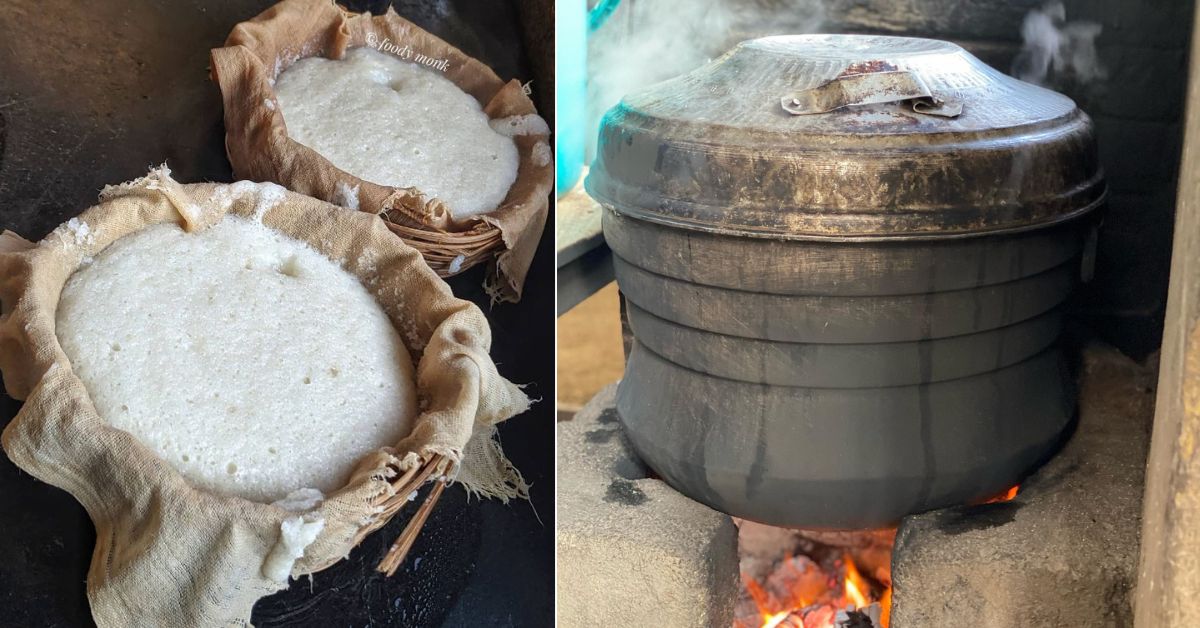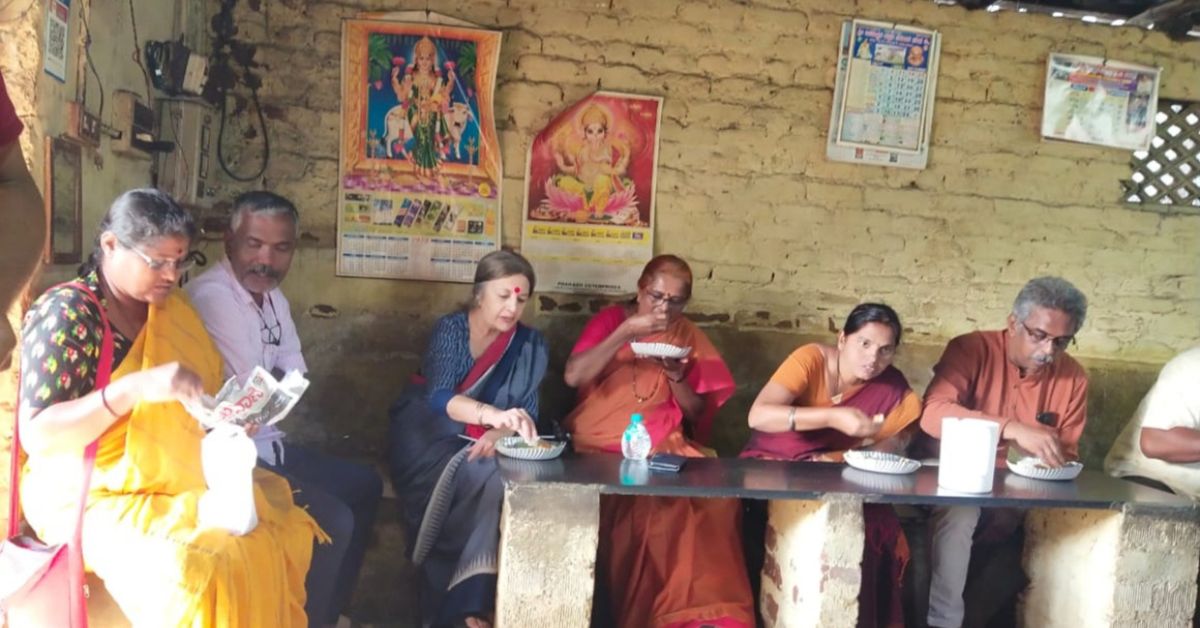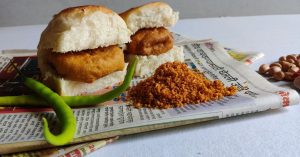This Village Eatery Has Been Steaming Chiblu Idlis in Bamboo for 70 Years
Located in Halaguru village of Karnataka, Babu Hotel has served chiblu idlis made in bamboo baskets for over seven decades. Its owner Bhakta Vatsala shares what makes these idlis unique.

Feature image credits: @foody.monk
Slathered with a dollop of butter, coconut chutney, and vegetable stew, nothing gets better than the soft and fluffy idlis as the first meal of the day. Not only in Southern India, but the humble idli today is one of the most popular breakfast choices across the country.
Over the years, cooks have added their own twists to prepare these steamed rice cakes. From traditional rice idli, rava idli, ragi idli, podi idli, plate-sized thatte idli, mini idli, button idli, mallige idli, and the khotte kadubu … the options are aplenty.
However, away from the hustle and competitive crowd of restaurants in Bengaluru, this small eatery called ‘Babu Hotel’ has been offering unique ‘chiblu idlis’ for nearly 70 years.
Located in a small hamlet Halaguru in the scenic countryside of Karnataka, the restaurant lures up to 500 customers on any weekday. Weekends and public holidays add more footfall.
The Better India got in touch with the restaurant owner Bhakta Vatsala to learn the secret behind his popular idlis.
Behind the scenes
In the 1950s, Vatsala’s grandfather Shivanna started a small hotel — it came to be christened as ‘Babu Hotel’ very recently — alongside farming to earn an additional income. Later on, his father took charge of running the eatery.
Although a graduate in sociology, Vatsala never dreamed big because of financial hardships in the family. So he chose to stick to his roots and continue the family business, unlike many of his peers who migrated to the nearby Bengaluru city for odd jobs.
In the absence of present-day idli makers, steamers and containers, the 45-year-old says that his family would steam idlis in small bamboo baskets, known as chiblu in Kannada.
Vatsala says, “Bamboo is available in abundance in our village. The villagers make and sell many items made using bamboo. That’s probably why my ancestors chose to utilise bamboo containers to make idlis back then. Moreover using bamboo makes the process very natural.”
Explaining the unique preparation method, he says, “Firstly, we pour the batter into the chiblus. They are small bowl-shaped moulds made using bamboo. The container gives the batter a perfect idli shape. We then place these small bamboo bowls into a large aluminium utensil using bamboo sticks for support. Then we let the idlis slowly steam over firewood.”
Vatsala informs that these aluminium vessels — around two feet in diameter — have the capacity to cook 80 idlis at a time. Every day, Vatsala and his team of six helpers prepare at least eight batches of 80 idlis to serve their now ever-growing customer base.
What makes these idlis distinctive from other cooking methods is their rich aroma and flavour. Vatsala says, “We prepare the batter in the same manner as others. But the whole process of cooking it in bamboo baskets on firewood imparts a rustic aroma and flavour to the idlis,” he says.
So far, these chiblu idlis have attracted thousands of customers including YouTubers, Government officials, ministers, movie celebrities and more.
After the popularity of Babu Hotel rose, Vatsala says, several other restaurants have cropped up around his village that are offering chiblu idlis using the same technique. “But they are unable to attract as much footfall as we do because the making of these chiblu idlis is an art. Every step of the process needs attention to detail. I grew up watching my family do this, so my learning is authentic. Otherwise, it is a cumbersome process,” he says.

However, the art of making idlis in this traditional manner is slowly disappearing because of time-saving idli makers. “We never thought of switching to idli steamers. This technique is all we know,” he says adding that they have been practising only this technique since his grandfather started.
Priced at Rs 10 a piece, the hot chiblu idlis at Babu Hotel are served with generous amounts of homemade butter, palya (fried vegetable stew) and fiery chilli chutney. Other than the popular idlis, the eatery also offers crisp ghee roast dosas like tuppa, bene and masala dosa, chitranna (spiced rice), rice baath, and palya.
‘We might close the eatery soon’
A typical day for Vatsala starts at 5.30 am and before 7 am, his hotel is up and running, ready to welcome their customers. “At noon, we soak the grains required for the next day’s batter. They need to soak for at least three to four hours. By 4 pm, we grind the soaked grains, and by late evening, we add salt to the batter, mix well, and keep it for fermentation. The batter then rises enough to make soft idlis in the morning,” he shares.
Babu Idli hotel, Halagur. Malavalli. Mandya. #Karnataka @sribasavaraju pic.twitter.com/oBMn1U7RsV— DP SATISH (@dp_satish) November 3, 2020
Babu Hotel is open for business between 7 am and 11 am every day. “We exhaust all our batter in this period. It takes us the remaining day to prepare batter for the next day. We are able to wind up only by 8 pm,” he says.
Until recently, this place was an obscure eatery located in a nondescript hamlet with a loyal customer base. But with the arrival of YouTubers and social media publicity, Vatsala says, he has gained popularity overnight, so much so that he might have to shut the business in a couple of years.
“Even earlier, our business was doing well, but with the internet, my business has flourished more than we imagined and can handle. Although the business is thriving now, I am exhausted with all the increased workload. I am unable to sustain the crowd, and I intend to shut the eatery in the near future,” he says.
Talking about hiring more people, Vatsala says, “We only have two village families comprising women in their 50s who help me to grind the grains. They’ve been with us for the past 15 to 20 years. Other than them, local people here are often not reliable. They come for a day and then disappear the next day.”
When asked why he is not considering expansion, he says, “I’m 45 years old, my father is in his 70s, and my son is just five! Though popularity has come to our business, the timing has been unfortunate. It is becoming increasingly difficult for me to sustain this very hotel and I cannot, at the moment, think of opening any other branches. In fact, now I am scared of the social media reach because my only hope to keep this place up is if I get reliable employees or volunteers to share the load.”
Today, Vatsala feels fulfilled looking back at a life of service, hard work, and dedication to his family and business. He finds joy in having transformed his family’s business into a lasting legacy.
If you wish to help Bhakta Vatsala keep ‘Babu Hotel’ running, you can contact him here: +91 98863 75522.
Edited by Pranita Bhat
If you found our stories insightful, informative, or even just enjoyable, we invite you to consider making a voluntary payment to support the work we do at The Better India. Your contribution helps us continue producing quality content that educates, inspires, and drives positive change.
Choose one of the payment options below for your contribution-
By paying for the stories you value, you directly contribute to sustaining our efforts focused on making a difference in the world. Together, let's ensure that impactful stories continue to be told and shared, enriching lives and communities alike.
Thank you for your support. Here are some frequently asked questions you might find helpful to know why you are contributing?














